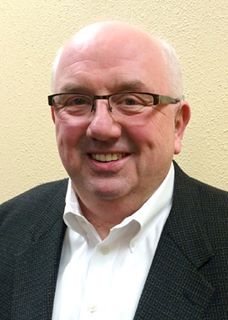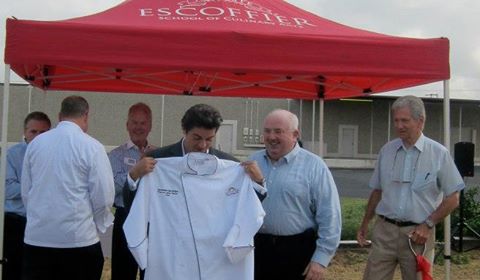By: Ryan Hodros, Culinary Arts Student
 I’ll be honest, I’ve been putting off writing this article. It was difficult to put the contents of my interview with Mr. Paul Ryan, co-founder and director of Auguste Escoffier, into a thousand word document without coming off as a brown-nose, but my respect for the man only goes up the more I learn about him. My first introduction was in April during Culinary School orientation, where I first learned about his background growing up outside Pittsburgh, but I sat down with him to get more details about him and the founding of the Auguste Escoffier School of Culinary Arts.
I’ll be honest, I’ve been putting off writing this article. It was difficult to put the contents of my interview with Mr. Paul Ryan, co-founder and director of Auguste Escoffier, into a thousand word document without coming off as a brown-nose, but my respect for the man only goes up the more I learn about him. My first introduction was in April during Culinary School orientation, where I first learned about his background growing up outside Pittsburgh, but I sat down with him to get more details about him and the founding of the Auguste Escoffier School of Culinary Arts.
As the middle child of six children, he worked in his family’s restaurant where he not only gained a great deal of insider information about the inner-workings of a restaurant, but also gained a great work ethic from his parents. However, he was burnt out on restaurants by the time he reached high school. “At that age,” he told me, “I best knew what I didn’t want to do.”
But in the Ryan family, college was not the priority as Paul and his siblings were expected to continue work in the family restaurant, so in 1968 he began looking for alternatives. Students of history already know that in 1968, the draft was in full swing, and with a father and older brother already Navy veterans, he decided to talk to military recruiters.
He wound up joining the army as a quartermaster and shipped to Long Binh, Vietnam a week before Christmas as part of the 1st Cav. He returned uninjured after a long time in the field, having grown up much faster than he expected. He also advanced from E1-E5 in 11 months, an unheard of progression in the military. After his return, he managed to wrestle a stateside assignment out of the detailers, becoming the supply scheduler in Ft. Bliss Texas.
“This was a big dose of the culinary world,” he said, describing the logistics of mass production he had to contend with through his time at Ft. Bliss. When his enlistment was running out, he became a part of the hotel business as a part of “Project Transition,” which was intended to help vets transition to civilian careers outside of the military. His last three months in were spent at a Holiday Inn in El Paso.
After getting a degree in Hospitality and Restaurant Management, he started a long career in the hotel industry, culminating with a position as Food & Beverage Director of nearly 2,000 hotels. When he retired from that industry, worried about uprooting his family throughout his career, he took a year off in order to determine what best to do with the rest of his life.
This was when he started a second career in culinary education, becoming a part of the Career Education Corporation and eventually the Regional Director of all Le Cordon Bleu schools. Having learned about this side of the culinary industry, he decided after a second retirement in 2008 to open a small boutique culinary school. “Jack Larson (Former CEO of Career Education Corp) told me when I pitched the idea, ‘if we’re going to do this, we need a brand. Nobody’s going to want to go to Paul and Jack’s Culinary Arts School.’”
As a veteran, he was drawn to the idea of naming the school after Auguste Escoffier. A veteran himself, Escoffier used his knowledge of military organization and hierarchy to revolutionize not only the inner-workings of the kitchen, but recipe books and kitchen manuals. So Mr. Ryan and Mr. Larson went to Europe to discuss the idea with Michel Escoffier, great-grandson of the famed chef.
“We wanted to do something different and affordable, but still focus on the classical techniques Escofffier himself would have taught,” Mr. Ryan said. “Michel [Escoffier] focused on how his great-grandfather was an innovator, and Jack kept telling me, ‘if we’re going to name the school after him, he have to be innovators too.’”
This has led to a number of innovations within the school, including a cutting-edge education that includes both the classics and modern developments like molecular gastronomy and modern plating techniques. It also includes innovations in online culinary technology, bringing vocational education to remote places like Valdez, Alaska (where Escoffier online training replaced the school’s culinary instructor after the chef unexpectedly left the school), as well as corporate business trainers, and those who can’t afford to make the transition to attend school.
There has also been a steadily increasing focus on becoming a Veteran-friendly school. I often find myself suspicious of schools who are “focusing on the Veterans,” but the passion with which Mr. Ryan spoke about his need to help veterans in their transition from military life dispelled all fears. “When [Vietnam Vets] like me came home, there was this huge stigma. It was hard to make that transition. I want to do everything I can to make sure [modern vets] don’t have to go through what I went through.”
Auguste Escoffier is accredited by the VA, and so veterans are able to use the GI Bill® to pay tuition. But Mr. Ryan and Mr. John Garcia sat down to discuss what else they could, which resulted in an “honor wall” framed pictures of the vets who have gone through Auguste Escoffier are hung. It also resulted in pins for veteran-students to wear on their uniforms, and the school is currently working towards bringing in more Veterans’ Administration staff to answer questions and explain the rights veterans have after their service is over.
As a Veteran and as a culinary student, it’s rare to meet someone like Paul Ryan. You learn early on in both careers to be suspicious of people who are above you in the chain of command. But Mr. Ryan is one of the most genuinely inspiring people I’ve met in a long time. I’m grateful for the opportunity to sit down and chat with him, and I’m also grateful for the opportunity he’s made possible at Auguste Escoffier.


